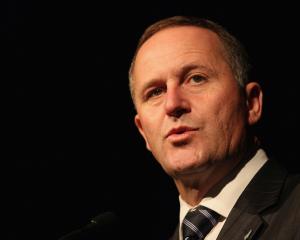Our tax system is far less progressive than many countries, including Australia.
ON January 20, the Tax Working Group (TWG) published options to make the tax system fairer and more effective, placing the ball squarely in the Government's court.
On Tuesday, Prime Minister John Key, delivering his annual speech, dropped the ball.
The Government's plan is mediocre, lacking in vision and the numbers do not appear to add up.
It is now clear the tax group's primary role has been to give National a veil of respectability so it can lower the top tax rate and call it a "step change", funded by a rise in GST that despite the rhetoric - will hit lower and middle income families hard.
Labour believes tax change must meet three tests.
It must be fair to all, grow the real economy, and be politically sustainable.
National's plan appears to fail all three.
Equity requires that each member of society pays a fair share relative to their ability to pay.
New Zealanders have long accepted that it is fair for those who can pay a little more to do so, hence we have a mildly progressive tax system.
The mantra that "3% of income earners pay 23% of tax" is demolished by the reality that the top 3% earn nearly 20% of total declared income. Our tax system is far less progressive than many countries, including Australia.
We all share common interest in a fair society that functions well.
There is ample evidence that fairer societies perform better economically.
Ordinary citizens depend on good quality public services more than those who can afford to buy their way out through private health and education.
Cuts to revenue are inevitably followed by cuts to services.
Closing tax avoidance loopholes is crucial to achieve a fair and effective tax system.
Only half of the 100 wealthiest New Zealanders pay the top tax rate of 38%.
The TWG argued legal avoidance through tax planning trusts, LAQCs and savings vehicles (PIEs, 30%) has gone too far and must be restrained.
Oddly, no mention was made of this in the PM's statement.
The TWG also argued for alignment of the top personal rate with the trust and company rates, a goal only Mexico and the Slovak Republic have achieved.
This would mean a dramatic and fiscally expensive cut to the top personal rate.
The TWG estimates a cost of $1.6 billion annually to achieve alignment at 30%-30%-30%, or $2.5 billion for 30-30-25 (with a lower company tax rate).
Given the Government's reminder that, despite the now strong growth forecast, we face a decade of fiscal deficits, revenue neutrality requires that the billions given back to top taxpayers have to be raised elsewhere.
At the heart of the dilemma is whether this can be achieved without shifting the net tax burden to middle income families and the battlers who have struggled bravely through the recession.
Raising GST to 15% would potentially raise up to $1.9 billion, but if the PM is to be taken at his word, the TWG estimates it would cost virtually the entire amount to insulate lower and middle income earners from the rising living costs that higher GST implies.
In other words, fully offset GST makes virtually no net contribution to funding upper income tax cuts, unless the PM's smiling rhetoric is not matched by budget reality.
Even if moderate income earners were compensated for the direct cost of GST, the equity consequences of the tax package based on equalising the top personal, trust and company rates, under any of the Government's scenarios, would be dire.
With a top personal tax rate at 30%, someone on the PM's salary gets an extra $500 a week, someone on the average wage gets 35c a week, and the hard-pressed minimum wage-earner gets nothing.
The Government ruled out many options suggested by the TWG, such as a land tax, an imputed risk-free return method of taxing rental property, and a comprehensive capital gains tax.
That leaves very little to fund income tax change and correct the property tax hole.
Deloitte estimates removing building depreciation would net only $0.7 billion to $1 billion.
PWC's John Shewan, who sat on the TWG, warned that the TWG never intended all building depreciation to be removed.
That leaves only removing depreciation loading on short-lived assets ($0.3 billion), which would hurt innovation and high tech; and changes to thin capitalisation thresholds ($0.2 billion).
The PM has hinted ring fencing property losses could be considered.
There is no fiscal free lunch.
To give big income tax cuts at the top end, there does not appear enough to fully compensate lower and middle income earners for the rise in GST.
National has signally failed to meet expectations.
As Bernard Hickey, of interest.co.nz, writes: "John Key has just sent Generations X and Y a clear message: Leave the country now."
It has failed the political sustainability test by rejecting a bipartisan approach.
Labour will continue to consider the TWG report seriously, and will develop its own responses in a careful, considered way.
Unlike National, Labour believes that having enough to make ends meet today, and building a better future for our kids, must both be achieved in any changes that New Zealand makes.
• David Cunliffe is Labour's finance spokesman.




